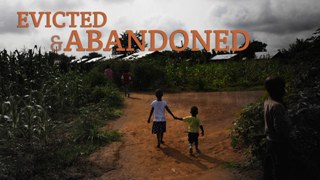World Bank Group Evictions

Just as World Bank directors were preparing for their spring meetings in Washington DC this year, a new wave of investigative reports broke, revealing sustained violations of the human rights of people affected by World Bank Group-funded projects across the planet. From Ethiopia, to India, to Peru, to Nigeria and the Philippines,World Bank-induced displacement was high on the agenda of experts, civil society actors, indigenous leaders and protesters.
The World Bank Group has funded the forced eviction of thousands of indigenous people in Ethiopia, according to a leaked report obtained by the International Consortium of Investigative Journalists (ICIJ). The group has been examining a health and education initiative that was buoyed by nearly $2 billion in World Bank funding over the last decade. Indigenous Anuak people in Ethiopia’s Gambella Province had testified that Ethiopian authorities used World Bank money to conduct massive forced relocations, while Ethiopian soldiers beat, raped and killed Anuak who refused to abandon their homes. Despite these long-standing allegations, the Bank continued funding the health and education “Protection of Basic Services” initiative for years. The Bank’s own Inspection Panel report found that the Bank knew about an “operational link” between its funding for an Ethiopian development initiative and the forced evictions of thousands of indigenous peoples. (See “Ethiopia’s Development under Human Rights Review” in Land Times No. 8.)
This forms part of the pattern of forced evictions over ten years of World Bank operations between 2004 and 2013. While the World Bank prefers to refer to these evictions as “involuntary displacement and resettlement,” the scale of the practice has evicted some 3,350,449, according to ICIJ. The findings are the outcome of efforts by over 50 journalists from 21 countries who took 11 months to document the World Bank Group’s failure to protect people pushed aside in the name of progress.
The reports have found also that the practice is escalating. In the second half of the review period (from 2009 to 2013 alone), the World Bank Group lenders pumped $50 billion into projects graded the highest risk for “irreversible or unprecedented” social or environmental impacts, doubling the funding of such projects in the previous five-year span.
The International Finance Corporation (IFC), the Bank’s private-sector investment arm, has announced that its mission is to “carry out investment and advisory activities with the intent to ‘do no harm’ to people and the environment.” However, the IMF figures prominently among the Group’s funders of projects with particularly harmful consequences for the environment, as revealed in an examination of an IMF-fundedPeruvian gold mine.
Already in 2013, the Bank admitted that it must make greater efforts “to build capacity and safeguards related to land rights—and to empower civil society to hold governments accountable.” World Bank Group President Jim Yong Kim said in March that he had “deep concern” about how the bank is handling the social impact of its projects. He has since announced an action plan for dealing with the concerns.
|